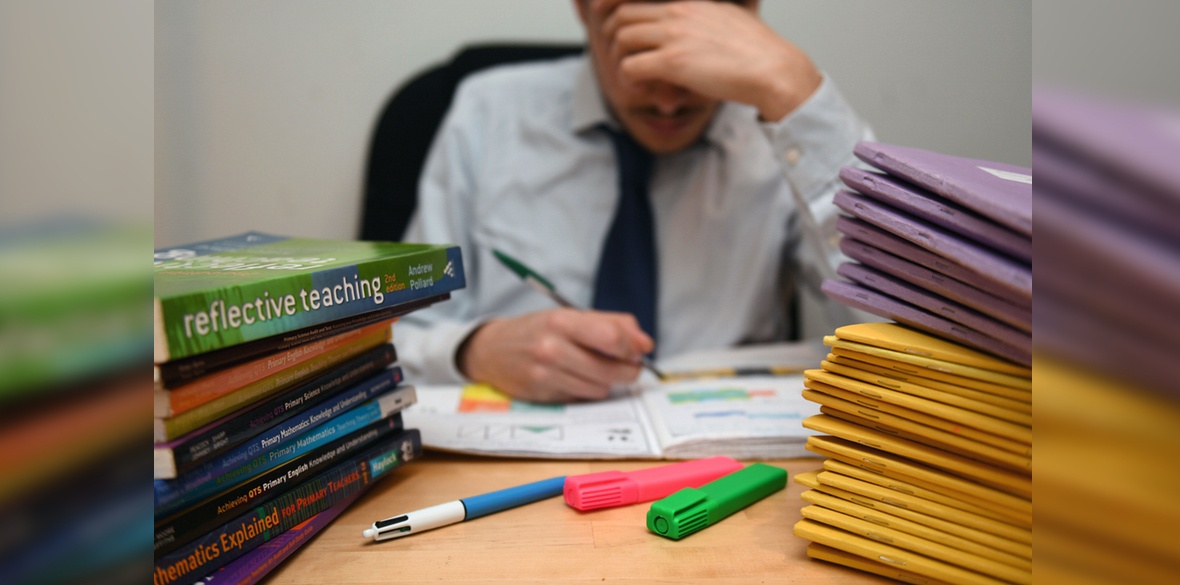This is the last article you can read this month
You can read more article this month
You can read more articles this month
Sorry your limit is up for this month
Reset on:
Please help support the Morning Star by subscribing here
IN THE National Education Union’s latest survey on workload 8,000 teachers gave the unequivocal message to government that enough is enough. Work-life balance is worse than a year ago and the linked issues of workload and accountability are the main reasons education professionals don’t see themselves working in the sector in the near future.
Two-fifths of respondents (40 per cent) predict they will no longer be working in education by 2024, and almost one-fifth of all respondents to the survey (18 per cent) expect to be gone within two years. The workload problem is across the workforce, affecting leaders, teachers and support staff. There is no greater challenge in the teacher recruitment and retention crisis than that of reducing workload and improving the nature of teachers’ work, and the high stakes, low-quality accountability system is a huge barrier to achieving this.
Appropriate professional autonomy, application of pedagogy, and use of their knowledge, skills and experience has been eroded by excessive national policy reform and an accountability system that drives bureaucratic evidencing of work rather than prioritising that which makes the biggest impact on teaching and learning. The downward pressure from a national level — government, and agencies such as Ofsted and Ofqual — must be addressed.
Secretary of State Damian Hinds’s commitment to addressing the workload problem is a good start but to date government action has been fiddling around the edges as opposed to the bold action that is required.
Workload won’t come down until the accountability regime is reset and rebalanced so that it can provide reliable assurance that children’s education is in safe hands without the detrimental effects on both pupils and teachers of teaching to the test and prioritising tasks, paperwork and data analysis for inspectors above those which support learners.
Comments received from teachers and support staff spoke volumes:
“My job is no longer about children. It’s just a 60-hour week with pressure to push children’s achievement data through.”
“Exhausted and fed up with the hours I have to maintain in order to keep abreast of paperwork demands. I love the teaching but have grown tired of how relentless the job has become.”
“With a young family, and despite working part-time, I have come to realise that a job in education is not conducive to family life.”
“Working 70 hours a week for many years has meant my health and family life have suffered. I am getting out before the job kills me.”
“I am so tired.”
When asked “what would be the one thing that would make your job better in the next 12 months?” complaints about the heavy marking and reporting and assessment workload were common. Many of the responses reflected a concern that the accountability regime both from Whitehall and within schools was damaging learning. One wrote:
“Less assessment for pupils, it creates too much pressure on pupils and creates too much marking for teaching, which is taking away from valuable lesson planning, which would be much more beneficial for pupils.”
Another said: “Trust being given back to the teachers. Less paper pushing and more focus on the children. Less emphasis on SATs results.”
“It is clear from our survey that the government is doing a far better job of driving teachers out of the profession than it is solving the issue of excessive workload. Damian Hinds has made many of the right noises about fixing the problem, but he and his predecessors have achieved very little.
“The fundamental problem, as the results of our survey shows, is one of excessive accountability brought on by the DfE and Ofsted. The blame is at their door. So long as the main drivers of a performance-based system are still in place, schools will continue to be in the grip of a culture of fear, over-regulation, and a lack of trust.
“We need drastic action and a major rethink from government if we are to stop the haemorrhaging of good teachers from the profession. Action so far — including clarification documents endorsed by the NEU — has not made the difference.
“No education system can exceed the quality of its teachers: government needs to stop de-professionalising, demoralising and burning teachers out. We are losing highly committed and highly qualified staff and children are losing out on the education they need.”
Dr Mary Bousted is joint general secretary of the National Education Union.











